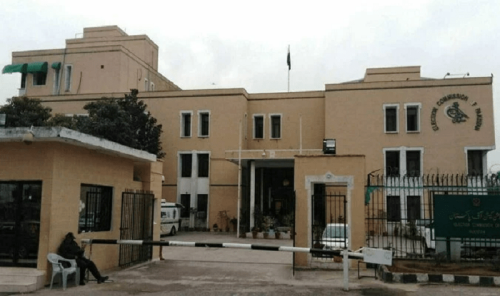ISLAMABAD: Using his “residuary powers” given in the rules, Senate Chairman Sadiq Sanjrani on Wednesday constituted an eight-member parliamentary committee to examine the amendments proposed by the Election Commission of Pakistan (ECP) to poll laws.
The move from the Senate chairman came two days after receiving a letter from Chief Election Commissioner (CEC) Sikandar Sultan Raja suggesting that the parliament should do legislation to do away with the president’s role in determining date for general elections. The CEC also sent a similar letter to National Assembly Speaker Raja Pervaiz Ashraf.
Letters on similar lines, signed by ECP Secretary Omar Hamid Khan, were also sent to the principal secretary to the prime minister and secretary for parliamentary affairs. Through these letters, the ECP proposed amendments to Sections 57(1) and 58 of the Elections Act 2017, reportedly stating that the commission wants its power back to announce and alter election schedule at any stage without any intervention by a third party.
According to a Senate Secretariat notification, the chairman constituted the committee in exercise of powers vested in him by Rule 264 of the Rules of Procedure and Conduct of Business in the Senate, 2012, in consultation with the National Assembly speaker “to examine the amendments proposed by the ECP in the Elections Act, 2017,” through a letter dated April 10.
Senate chairman forms panel on basis of CEC’s letter; Fawad terms communication a ‘foolish act’
The committee has four members each from the Senate and the National Assembly. Law Minister Azam Nazeer Tarar and Parliamentary Affairs Minister Murtaza Javed Abbasi, both belonging to the ruling Pakistan Muslim League-Nawaz (PML-N), will be the ex-officio members of the committee.
The committee comprises Senator Ali Zafar of the opposition Pakistan Tehreek-i-Insaf (PTI), Senator Kamran Murtaza of Jamiat Ulema-i-Islam (JUI-F), Senator Taj Haider of the Pakistan Peoples Party (PPP), independent Senator Dilawar Khan, PTI dissident MNA Dr Afzal Dhandla, Commerce Minister and PPP leader Syed Naveed Qamar, Mohsin Nawaz Ranjha of PML-N and Sabir Kaimkhani of the Muttahida Qaumi Movement-Pakistan (MQM-P).
Talking to Dawn, PTI’s Senior Vice President Fawad Chaudhry said the Senate chairman had constituted the committee without seeking the consent of his party. He, however, said that the party would make a decision about participation or boycott of the committee after in-house consultations.
Mr Chaudhry criticised the ECP for writing the letter and termed it a “foolish act”, stating that under no circumstances the ECP could run away from its responsibility of holding elections within 90 days of the dissolution of any legislature as mentioned in the Constitution.
Senate’s Rule 264, titled “Residuary powers of the Chairman” reads, “All matters not specifically provided for in these rules and all questions relating to the detailed working of these rules shall be regulated in such manner as the chairman may, from time to time, direct.”
The CEC in his letter to the Senate chairman and the NA speaker had mentioned Section 11 of the original Representation of Peoples Act (ROPA) of 1976 which empowered the Commission to announce poll date unilaterally without any trace of intervention by a third party.
“The Section was amended through Ordinance No 11 of 1985 (12.1.1985) with the sole object to create the role of the president to hold the elections at the whims of one man,” writes the CEC.
“Amendment to Section 11 of ROPA 1976 introduced in 1985 was subsequently replicated in Section 57 of the Elections Act, 2017. Therefore, Section 57(1) of the Act to the extent of role of the president to announce poll date is against the spirit of the constitution and ultra vires of proviso of Article 222, as it has abridged and taken away the ECP powers mandated under Article 218(3) and 219,” read the letters, adding: “supplanting the amendments resulted in dilution of the authority of the constitutional mandate vested in the ECP on account of Article 218(3) of the Constitution.”
The CEC had reportedly noted that the March 1 and April 4 judgements of the Supreme Court had divested the ECP of its constitutional powers to determine as to whether conducive environment in fact and circumstances, existed for the conduct of elections in a given time, to meet the standards mentioned in Article 218(3) in letter and spirit.
He argued that the writ of the ECP had systematically been challenged on several occasions. “In practice, ECP’s authority has been eroded,” he remarked.
Published in Dawn, April 13th, 2023














































Dear visitor, the comments section is undergoing an overhaul and will return soon.